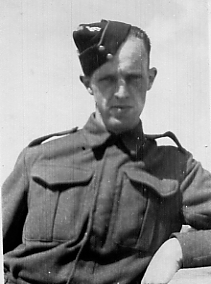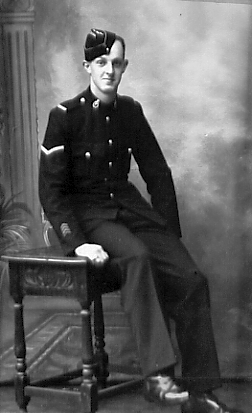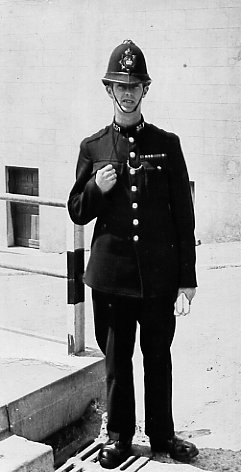|
THE GROWING UP YEARS |
|||||||||||||||
|
James William Henry Jarman, was born at Devon
House, 8, Upper Market Street Haverfordwest in Pembrokeshire on 24th
January 1924. He was the son of a Metropolitan Policeman who was stationed with the Thames Division at Pembroke Dockyard from May 1914 - 1926. When Jimmy was 2 years old, the dockyard was closed and his father was transferred back to London and they then took up residence at Forest Hill and later at Sydenham S.E .London. On leaving primary school Jim won a scholarship in August 1939 to Brockley County Boys School and as usual he spent his summer holidays with his grandmother at Haverfordwest. War was declared on the Sunday but with the glorious weather and everyday being spent on the beach at Broad Haven, under no circumstances was the young Jimmy going to return to London a week early. When he eventually reported back to school, a week late, everybody had been evacuated and the school was commandeered by a heavy Anti-Aircraft battery. Word got around and he was due to be sent for but with the chaos of the school being evacuated to Kent, time passed and the London County Council revoked his scholarship provided he registered at the Junior Labour Exchange in Catford for work.
On being asked what type of work he would like he replied "an engineer" he was given the choice of "Civil or Mechanical" and chose the former.
Jimmy was then sent for an interview to Redpath Brown the steel constructional engineers at Greenwich and became a trainee costing clerk. He enjoyed working for this large company, it was situated where the Millennium Done is now sited. Everything went smoothly but then a shadow drifted over the country with the coming of the Dunkirk evacuation.
Jim and a friend decided to enlist in the L.D.V and
added a year to their ages. Then the first daylight bombing raids started
and as they came up the Thames, the company being opposite the large East
India Docks were on the receiving end. They had a grandstand view later of
the Battle of Britain, and Jim used to do guard duty with the L.D.V
every third night at the Crystal Palace waterworks and while coming off
guard on the 30th November 1940 he discovered a landmine had dropped on
the corner of the street where he lived. As luck would have it his father
was in the City at the time working on security with the Post Office and
his mother was in the cellar of the pub across the road, so they escaped.
When his father returned home he decided that they salvage what they could
and move back with his Grandmother in Haverfordwest.
Then the District Supervisor from Carmarthen asked him to go to Aberystwyth for two weeks to help compile a ration register for the shop and stores which stood opposite the bandstand. After a week the manager was called up into the R.A.S.C (EFI) branch of the NAAFI and Jim was asked to hold the fort until a new manager could be found. He had only just had his 17th birthday but found the book keeping in the NAAFI easy. Eventually an old man was brought in from Neath but he could not manage the paperwork and Jim was asked to remain as a Trainee Manager (he could not take over as a manager until his 18th birthday) and he was enjoying the work. The shop was closed down and it remained a ration store for the RAF aircrew wing and the Royal Artillery Field Training Regiment, In January 1942 he had his eighteenth birthday and became a full qualified Stores Manager. In February of that year he was asked to take over as Manager at RAF Blaennerch Aberporth. This had a a small shop and stores to serve the camp, Although he was paid a lodging allowance he had a bedspace in one of the nissen huts with the clerks and M.T. section. While at Aberystwyth he had volunteered to join the RASC Expeditionary Force of Institutes (all NAAFI personnel went abroad in the RASC). It was in June that Jim went to Llanelli for a medical and then in September he received his call up papers, and was amazed to find he was to report to No 41 Infantry Training Centre at Deepcut Barracks. The barracks were modern, built in 1938 for the Militia men and were a lot more comfortable than the nissen hut at Aberporth. The
first six weeks infantry training was tough, from 0600 hours to 2000hrs
daily, it was also very physical but thorough, and although he found it
hard going he in fact enjoyed it! On Pass Out, his platoon was posted to
the holding Company where they would be passed on as reinforcements to
various regiments. It was then to his horror that he was told he was
to be transferred to the Royal Corps of Signals at Huddersfield! This brought scary images of him having to climb
telegraph poles and laying cables!
|
||||||||||||||




